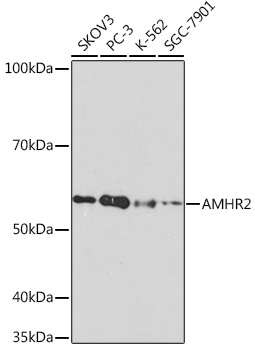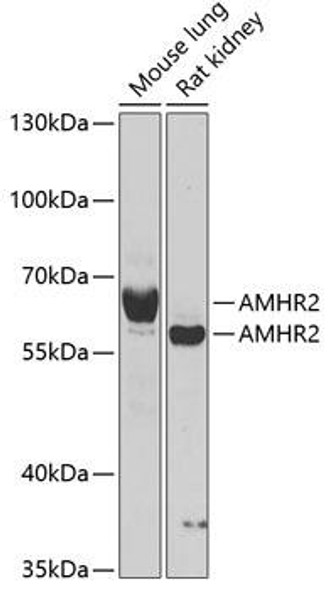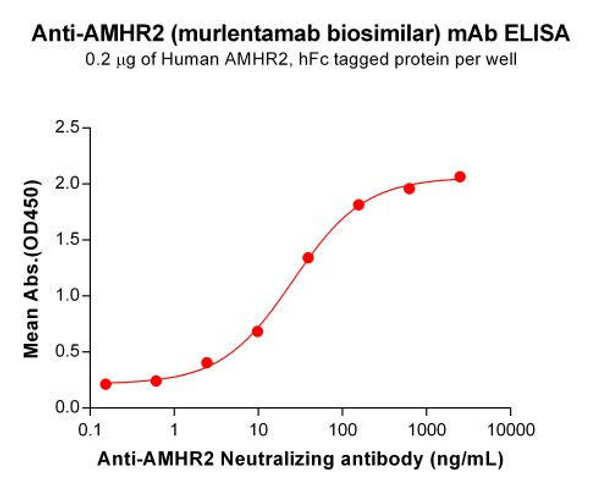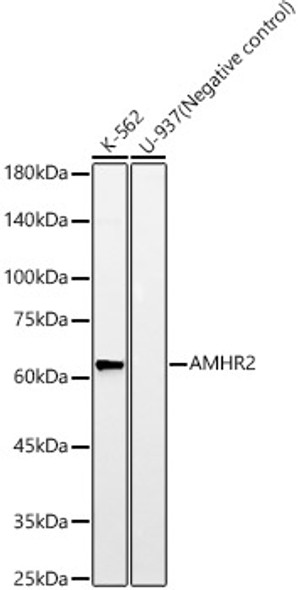Cell Biology Antibodies 17
Anti-AMHR2 Antibody (CAB8813)
- SKU:
- CAB8813
- Product Type:
- Antibody
- Reactivity:
- Human
- Host Species:
- Rabbit
- Isotype:
- IgG
- Antibody Type:
- Monoclonal Antibody
- Research Area:
- Cell Biology
Description
| Antibody Name: | Anti-AMHR2 Antibody |
| Antibody SKU: | CAB8813 |
| Antibody Size: | 20uL, 50uL, 100uL |
| Application: | WB |
| Reactivity: | Human |
| Host Species: | Rabbit |
| Immunogen: | A synthesized peptide derived from human AMHR2 |
| Application: | WB |
| Recommended Dilution: | WB 1:500 - 1:2000 |
| Reactivity: | Human |
| Positive Samples: | SKOV3, PC-3, K-562, SGC-7901 |
| Immunogen: | A synthesized peptide derived from human AMHR2 |
| Purification Method: | Affinity purification |
| Storage Buffer: | Store at -20'C. Avoid freeze / thaw cycles. Buffer: PBS with 0.02% sodium azide, 0.05% BSA, 50% glycerol, pH7.3. |
| Isotype: | IgG |
| Sequence: | Email for sequence |
| Gene ID: | 269 |
| Uniprot: | Q16671 |
| Cellular Location: | |
| Calculated MW: | 55kDa |
| Observed MW: | 60KDa |
| Synonyms: | AMHR, MISR2, MISRII, MRII |
| Background: | This gene encodes the receptor for the anti-Mullerian hormone (AMH) which, in addition to testosterone, results in male sex differentiation. AMH and testosterone are produced in the testes by different cells and have different effects. Testosterone promotes the development of male genitalia while the binding of AMH to the encoded receptor prevents the development of the mullerian ducts into uterus and Fallopian tubes. Mutations in this gene are associated with persistent Mullerian duct syndrome type II. Alternatively spliced transcript variants encoding different isoforms have been identified. [provided by RefSeq, Sep 2009] |
| UniProt Protein Function: | MISR2: On ligand binding, forms a receptor complex consisting of two type II and two type I transmembrane serine/threonine kinases. Type II receptors phosphorylate and activate type I receptors which autophosphorylate, then bind and activate SMAD transcriptional regulators. Receptor for anti-Muellerian hormone. Belongs to the protein kinase superfamily. TKL Ser/Thr protein kinase family. TGFB receptor subfamily. |
| UniProt Protein Details: | Protein type:Membrane protein, integral; Kinase, protein; Protein kinase, Ser/Thr (receptor); Protein kinase, TKL; EC 2.7.11.30; TKL group; STKR family; Type2 subfamily Chromosomal Location of Human Ortholog: 12q13 Molecular Function:hormone binding; protein binding; receptor activity Biological Process: sex differentiation; signal transduction Disease: Persistent Mullerian Duct Syndrome, Types I And Ii |
| NCBI Summary: | This gene encodes the receptor for the anti-Mullerian hormone (AMH) which, in addition to testosterone, results in male sex differentiation. AMH and testosterone are produced in the testes by different cells and have different effects. Testosterone promotes the development of male genitalia while the binding of AMH to the encoded receptor prevents the development of the mullerian ducts into uterus and Fallopian tubes. Mutations in this gene are associated with persistent Mullerian duct syndrome type II. Alternatively spliced transcript variants encoding different isoforms have been identified. [provided by RefSeq, Sep 2009] |
| UniProt Code: | Q16671 |
| NCBI GenInfo Identifier: | 9087133 |
| NCBI Gene ID: | 269 |
| NCBI Accession: | Q16671.1 |
| UniProt Secondary Accession: | Q16671,Q13762, Q647K2, A0AVE1, B9EGB7, E9PGD2, F8W1D2 |
| UniProt Related Accession: | Q16671 |
| Molecular Weight: | 51,827 Da |
| NCBI Full Name: | Anti-Muellerian hormone type-2 receptor |
| NCBI Synonym Full Names: | anti-Mullerian hormone receptor type 2 |
| NCBI Official Symbol: | AMHR2 |
| NCBI Official Synonym Symbols: | AMHR; MRII; MISR2; MISRII |
| NCBI Protein Information: | anti-Muellerian hormone type-2 receptor |
| UniProt Protein Name: | Anti-Muellerian hormone type-2 receptor |
| UniProt Synonym Protein Names: | Anti-Muellerian hormone type II receptor; AMH type II receptor; MIS type II receptor; MISRII; MRII |
| Protein Family: | Anti-Muellerian hormone type-2 receptor |
| UniProt Gene Name: | AMHR2 |
| UniProt Entry Name: | AMHR2_HUMAN |
View AllClose







